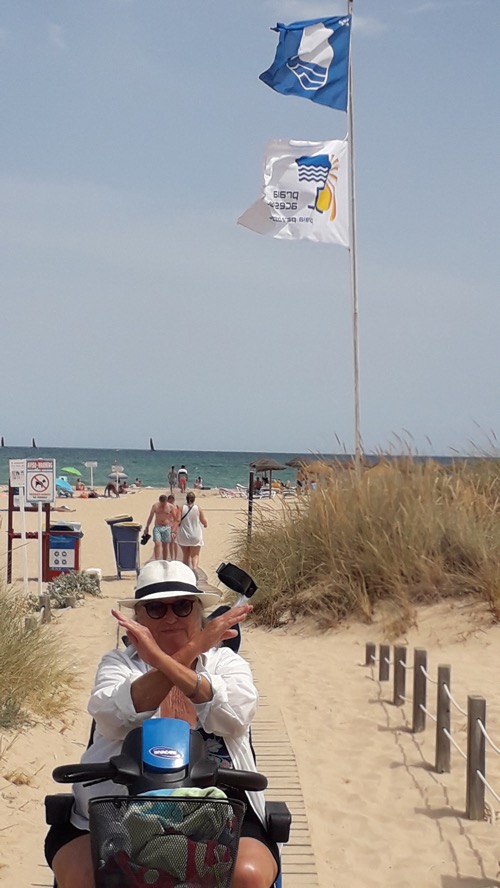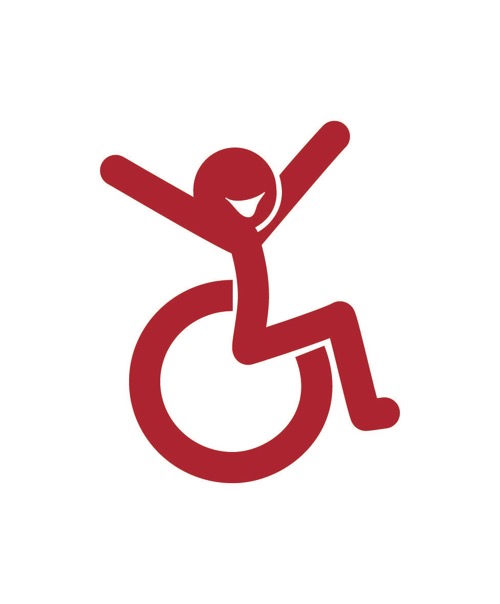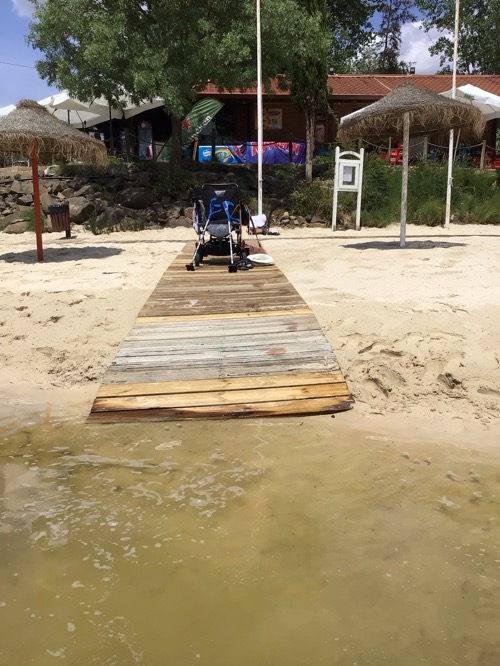The proposal to monitor the Blue Flag program, is to improve conditions for people with reduced mobility (PWRM) who visit Algarve beaches.
While thousands of residents and visitors flock to the beautiful sun soaked beaches this summer for swimming, sun bathing, donuts and fun, many people will be left out in the cold. In order to verify which beaches in the Algarve are fully equipped and accessible for PWRM, Constance, Kevin and volunteers will be visiting the beaches in the Algarve that have been designated by Portuguese and international authorities as accessible.
What is a Blue Flag?
Blue Flag is a global program run by the Foundation for Environmental Education (FEE) headquartered in Copenhagen, Denmark. https://www.blueflag.global
"When owners/operators of beaches, marinas and boats are awarded the right to display the Blue Flag, it is because they have complied with a number of stringent environmental, educational, safety, and accessibility criteria at the time of the award. Following the award, the owners/operators accept full responsibility to ensure continued compliance with all of these criteria. While FEE may carry out checks of sites from time to time, neither FEE, nor any of its officers, members or jury members accept any responsibility to any person in the event of any non-compliance.” Source FEE website.
In Portugal the Blue Flag program (Bandeira Azul) is administered by the Association for the Blue Flag and Environmental Education (ABAAE). In order to receive a Blue Flag each county (conselho) must have at least one beach that meets accessibility criteria. Although some counties do more than the minimum.
In 2023, 372 beaches in Portugal were awarded the blue flag, including 87 in the Algarve, 45 of them are accessible according to the Algarve Tourism board. https://visitalgarve.pt/en/3276/accessible-beaches.aspx
The Portuguese Environment Agency https://apambiente.pt has launched the app “info praia” that gives directions and real time information on bathing conditions including assistance and the availability of equipment on each blue flag beach. The app is in Portuguese and English.
The Problem
There is very little to no monitoring once a flag is awarded, and no guarantee that a person with reduced mobility has ever checked the location before the flag was awarded.
This is where our proposal comes in.
Constance became permanently disabled in 2014 due to a hospital infection. She now uses a wheelchair and or a mobility scooter for her mobility outside the home.
Unfortunately Constance now has first hand experience of the obstacles to traveling and freedom of movement faced by people with reduced mobility in Portugal. Now she would like to put her experiences to work to help change things for all residents and visitors to Portugal who face challenges with mobility.
In the past few years Constance and Kevin have personally checked the compliance of blue flag beaches in Lagos, Alcoutim and Olhao.
Our experience has been very mixed, with some blue flag beaches that were identified as being accessible having no access at all, some with areas for improvement, and some with very good access. In some cases when we contacted the local authorities to point out accessibility problems we did not receive an answer.
When we contacted the ABAAE, they were apologetic but all they could do was to forward our assessments back to the local authority. In one case it took three separate visits and complaints to ensure that the beach was accessible. In other cases we have written to praise local authorities and make suggestions for minor improvements and those have been well received.

The Solution
Constance, her wheelchair, assisted by Kevin and a volunteer driver, will visit at least 10 of the 45 beaches and Marinas in the Algarve designated as accessible by FEE, ABAAE, and the ATB.
She will document the accessibility of each beach with field notes, photographs and video. The monitoring will take place from mid June until mid September.
The criteria we will assess is the following:
- Ease of access onto the beach itself, including ramps boardwalks, parking and adequate sign posting.
- Ease of access into the water for bathing, including equipment and personal assistance.
- Access to bathrooms and other facilities such as showers, snack bars, restaurants, etc.
In cases where a beach is completely inaccessible we will email the ABAAE and the relevant local authority within 24 hours, asking them to immediately correct the problem.
In October we will complete a detailed written report of the findings to assess tye effectiveness of the Blue Flag Program. The report will designate each beach visited as either, not accessible, partly accessible, or accessible. The report will be sent to the relevant local, national, international authorities and organizations.
We will publish the report in full on our website accessiblealgarve.com. It is hope this project may act as a pilot program that could be implemented by others with reduced mobility in different regions of Portugal.
Constance, Kevin, and a driver (also a person with reduced mobility ) will be volunteering their time, but we need your support to help with expenses.
Funding will be needed for the following:
Costs of public transportation, taxis, fuel and tolls for the car.
Overnight stays in hotels, when necessary. (Most locations can be monitored as day trips)
We estimate the budget to be approximately 1,000 euros.
Your support will help improve conditions for people with reduced mobility (PWRM) who visit Algarve beaches.
Any donation from 10, 50, 100 euros/dollars will be very welcome.
Remember, Accessibility is a human rights issue, not a matter for discretion.

Thank you for your support!



